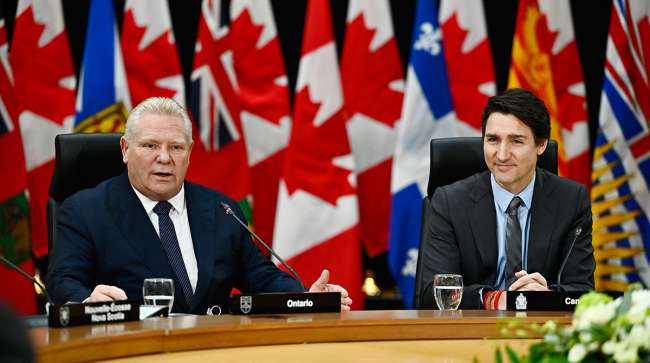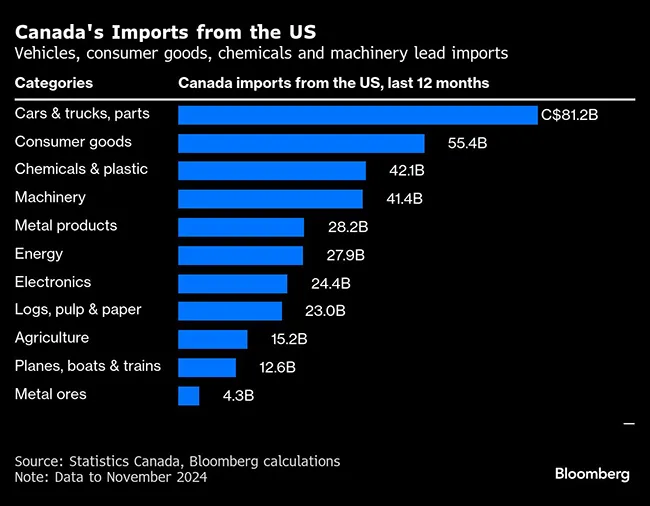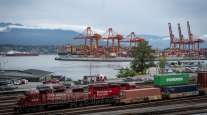Bloomberg News
Canada’s Counter-Tariff Plan Would Target US Aluminum, Steel

[Stay on top of transportation news: Get TTNews in your inbox.]
Canada’s draft plan to retaliate against U.S. tariffs may roll out in stages, with the government preparing to hit all American steel and aluminum products with counter-tariffs if necessary, said an official with knowledge of the matter.
Prime Minister Justin Trudeau’s government is preparing for a number of scenarios depending on what U.S. President-elect Donald Trump does after the inauguration, the official said, speaking on condition they not be identified.
If Trump imposes any tariffs on Canada, the immediate response from Ottawa would likely be targeted at about 10 high-profile goods such as Florida orange juice and Kentucky bourbon, meant to generate U.S. attention, the person said.
But Canada has also drafted much longer lists of potential tariffs if Trump proceeds with broad trade measures against its northern neighbor, which is the largest buyer of U.S. manufactured goods. One of those lists adds up to about C$37 billion ($26 billion) worth of U.S. products, and another goes to C$150 billion.

Trudeau outlined some of the plan in a Jan. 15 meeting with leaders of Canada’s 13 provinces and territories. It would only be triggered if Trump hits Canada with tariffs first; the Canadian government’s position is that the U.S.-Mexico-Canada agreement — a revised regional trade deal negotiated by Trump in his first term in office — should continue to apply.
If it comes to a broader trade war, however, Canada’s retaliation list would apply to a massive range of products — including all steel and aluminum products Canada imports from the U.S., the official said. It would be posted for public consultation before any tariffs are implemented.
Canada imported 3.74 million tons of steel products from the U.S. in 2023, valued at about $5.93 billion, according to U.S. Commerce Department data. U.S. aluminum exports to Canada amounted to 430,000 tons for that year, with a value of $1.91 billion, the department said.
In 2018, when Trump imposed some restrictions on Canadian steel and aluminum, Canada retaliated with its own levies against about $16.6 billion of U.S. goods.
Trudeau’s stated aim is to be proportional to what Trump does, and avoid escalating the situation while still finding Canada’s areas of leverage with the U.S. “Everything is on the table and I support the principle of a dollar-for-dollar response,” Trudeau told reporters on Jan. 15.
With the threats of tariffs from the incoming U.S. administration, Prime Minister Justin Trudeau launches the Council on Canada-U.S. Relations. Learn more: https://t.co/d3oVRJVWfH — CanadianPM (@CanadianPM) January 16, 2025
But Canadian government officials told Bloomberg that if Trump truly tariffs everything from Canada, including oil, it becomes impractical to match the value in response.
At that point, Canada would have to look at other policy responses to convince Trump that the trade war isn’t worth it.
“The question that we ask ourselves first and foremost is: If the administration chooses to bring in tariffs, what is it that we can do that would result in the lifting of those tariffs as quickly as possible?” Trudeau said.
Canada’s energy and critical mineral exports to the U.S. are the trickiest issue. If Trump exempts those from tariffs, Trudeau’s government has examined the possibility of using export taxes — essentially a surcharge designed to drive up the cost of fuel and electricity in the U.S. and apply pressure to the U.S. administration.
How about this for building a “Team Canada 🇨🇦” approach?
1. Stop threatening the livelihoods of tens of thousands of Albertans & Canadians via an energy export tax or ban.
2. Immediately start construction on the Northern Gateway & Energy East pipelines to diversify our… pic.twitter.com/OPQiHBX3sG — Danielle Smith (@ABDanielleSmith) January 16, 2025
But the idea of export taxes has already generated a backlash from the western provinces of Alberta and Saskatchewan, where Canada’s deposits of oil, uranium and potash are concentrated.
Alberta Premier Danielle Smith refused to sign the joint statement out of the meeting between the prime minister and premiers, saying she couldn’t agree to any plan that included the possibility of taxing or reducing energy exports.
“We will take whatever actions are needed to protect the livelihoods of Albertans from such destructive federal policies,” Smith said in a social media post.
Want more news? Listen to today's daily briefing below or go here for more info:




